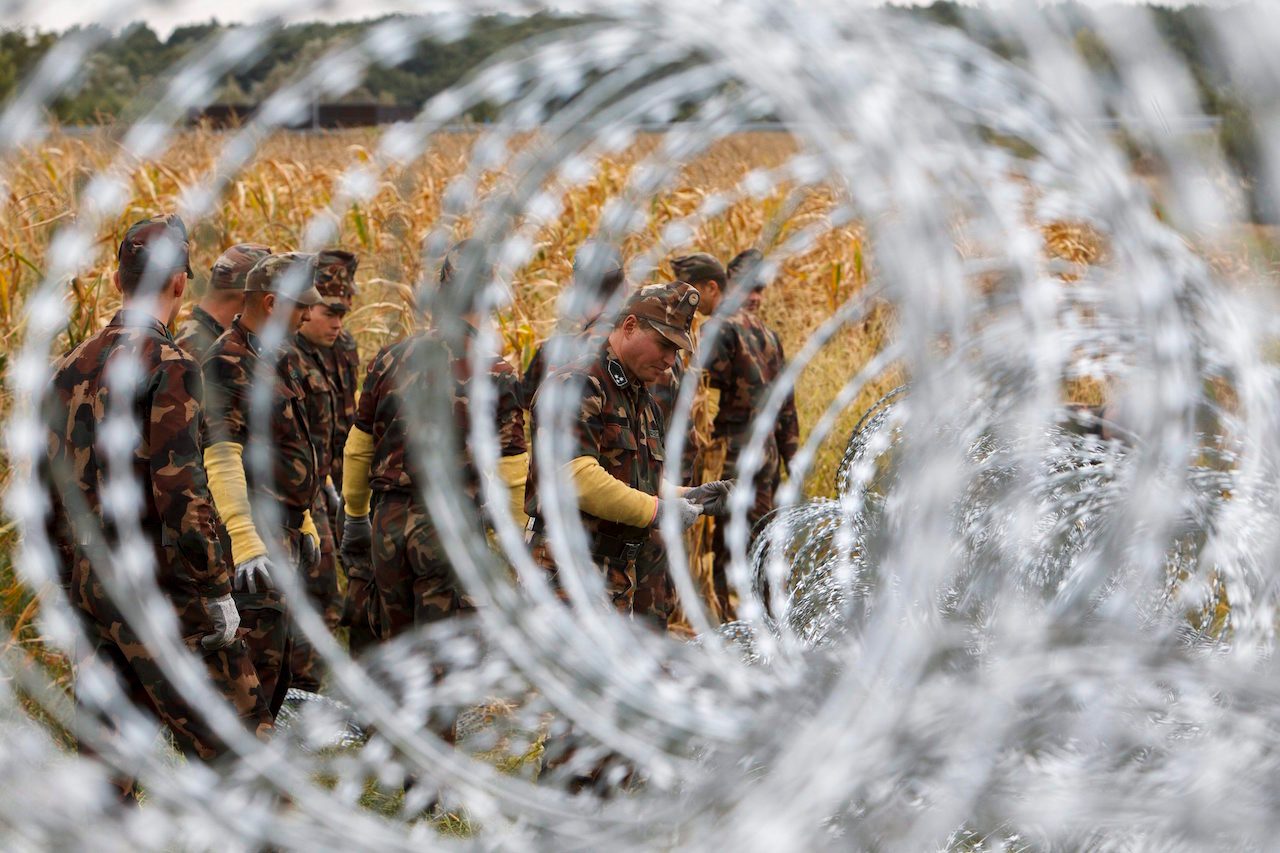SUMMARY
This is AI generated summarization, which may have errors. For context, always refer to the full article.

BUDAPEST, Hungary – Croatia and Serbia traded ugly barbs Thursday, September 24 and slammed tit-for-tat border restrictions on each other as Hungary started building yet another razor-wire barrier to keep refugees out, this time with neighboring Slovenia.
The face-off between Zagreb and Belgrade, the worst since they fought a war in the 1990s, came as thousands of migrants continued to stream through the Balkans towards northern Europe, particularly to Germany where Chancellor Angela Merkel warned the EU was a long way from tackling the worst migration crisis it has ever faced.
The unprecedented flow has put the old enemies at each other’s throats after Croatia closed all but one of its border crossings to slow the tide, and accused Serbia of doing a deal with Hungary to send migrants its way.
Budapest sealed its border with Serbia last week, closing the main crossing and laying down razor wire along the entire frontier, prompting thousands of migrants to enter the EU through Croatia instead.
Hungarian police said 10,046 migrants, a new daily record, had arrived Wednesday, September 23 from Croatia, and Budapest announced it would decide “soon” whether to also shut that border.
It has already laid a razor-wire barrier along 40 kilometers of the frontier with Croatia not marked by the Drava river, and on Thursday Slovenia’s foreign ministry said Hungary had also begun building a barrier on its border – the first within the passport-free Schengen zone.
‘No longer the case’
The news was likely to bring further difficulties for migrants, many of them Syrians, who under normal circumstances would be celebrating the major Muslim feast of Eid al-Adha.
“Eid al-Adha was the most happy and powerful moment for my family, it’s no longer the case,” said Cecilia, a student from Damascus, her face in her hands as she sat in a remote field in Croatia.
“It’s no longer the case.”
UN Secretary-General Ban Ki-moon on Thursday welcomed the EU’s decision to inject $1 billion to help countries overwhelmed by Syrian refugees, but said “efforts are still required to resolve the crises and conflicts that cause people to flee, including in Syria”.
On Tuesday, September 22 almost 9,000 migrants entered Croatia, also a new high. Over the last week, more than 44,000 refugees have entered the country from non-EU Serbia.
That influx has fuelled tensions between the two countries. In tit-for-tat moves overnight, Zagreb and Belgrade further restricted traffic at the last major crossing point still open between them, with each side stopping vehicles with plates from the other country.
Serbian Prime Minister Aleksandar Vucic accused Croatia of waging “economic aggression against Serbia”, while the foreign ministry compared the measures taken by Zagreb to those “taken in the past at the time of the (Nazi) fascist regime in Croatia” during World War II.
Croatian premier Zoran Milanovic said Belgrade had struck a “deal” with Budapest to send all migrants to Croatia, which he warned could not cope with such large numbers.
Milanovic was one of 28 EU leaders who took part in an emergency summit in Brussels Wednesday, during which they agreed to boost aid for Syria’s neighbours – home to millions of refugees fleeing war and Islamic State extremists – to stop them coming to Europe.
Major divisions
EU president Donald Tusk said they also agreed to strengthen the bloc’s outer frontiers, with foreign affairs chief Federica Mogherini announcing Thursday that warships will be used against traffickers in international waters in the Mediterranean from October 7.
Controversial “hotspot” reception centres are also to be set up in frontline states to quickly sort people fleeing conflict from economic migrants.
The run-up to the summit had seen major divisions open in the 28-nation bloc, especially between western and former communist eastern members.
On Tuesday, interior ministers decided to relocate 120,000 refugees, defying opposition from eastern states Hungary, the Czech Republic, Romania and Slovakia.
Slovak Prime Minister Robert Fico said he would appeal to the EU’s top court rather than accept the “diktat” from Brussels.
Hungarian leader Viktor Orban, meanwhile, has repeatedly been criticized for his country’s border closures, and his office said he would visit his Austrian counterpart Werner Faymann on Friday, September 25 in Vienna to discuss the crisis.
France, meanwhile, said it could take up to 30,000 asylum seekers, while Germany said it would unblock additional funds to help regional states cope. (READ: Europe migrant crisis ‘manageable’ – UN refugee agency)
The relocations account for just a fraction of the 500,000 migrants who have come to Europe so far this year and the estimated four million camped on Syria’s borders. – Geza Molnar, with Katarina Subasic in Belgrade, AFP/Rappler.com
Add a comment
How does this make you feel?
There are no comments yet. Add your comment to start the conversation.